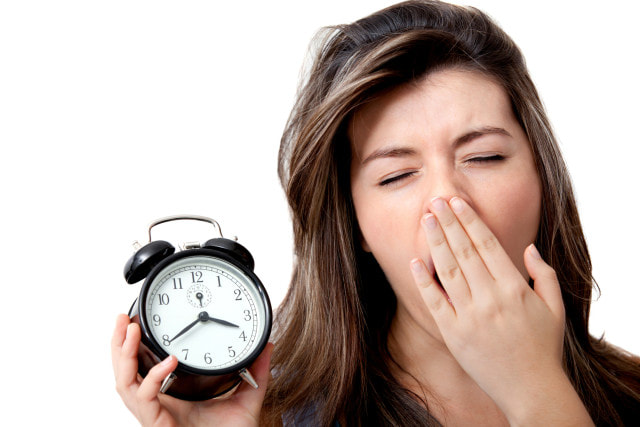|
The 8-hour sleep routine, going to bed by 10 in the night or sleeping without the smartphone by your side table have become unimaginable or almost impossible. Stress, anxiety and sleeplessness can be blamed only to a certain extent to disturbed sleep quality and there are many more health connections beyond these that can affect our sleep. Even medications that we take for these health issues can hinder our peaceful sleep routines. Given here are some common conditions that can affect our everyday sleep routine badly:
Allergies: Allergies can ruin a person’s sleep time badly due to intermittent coughing, sneezing, congestion and itchy/watery eyes that can cause poor sleep quality due to frequent sleepless nights. Mild obstructive sleep apnea (pauses in breathing) can worsen things as the person starts breathing through his/her mouth causing inconvenience to him/her. Also, allergic medication can prevent a person from sleeping while certain other medications can leave the person feeling drowsy unable to focus on work the next day. Asthma: More than 60% of people with asthma face coughing, breathing and wheezing problems that interrupt sleep. Asthma-related drugs can cause sleep problems and frequent sleeplessness during the night and so do inhaler drugs that individuals commonly use for relief. Alzheimer’s disease: Alzheimer’s is one grave disease troubling the affected person and the people surrounding them. More often, Alzheimer’s leads to insomnia and daytime sleeping that are predominantly present during the later stages of the disease. Slightly adjusting daytime schedules along with medications (if needed) can elevate sleep quality. Knowing what not to do when you have an individual with Alzheimer's at home is more important than knowing what to do! Get the complete do's and don'ts list from the website www.firsteatright.com. Chronic obstructive pulmonary disease (COPD): Lung disorders such as emphysema, chronic bronchitis and asthma can make a person suffer from coughing, chest pain and breathing difficulty that again hinders sleep quality. Also, 15% of people with COPD suffer from sleep apnea and certain medications used for COPD can cause sleep problems. Benign prostatic hyperplasia: Men above the age of 60 often have an enlarged prostate gland which compels them to get up to use the bathroom two or more times each night. Medications can help these men often. Congestive heart failure: This disease reduces the heart’s ability to pump blood along with increasing the risk of sleep apnea and periodic shaking of the arms and legs called periodic limb movements. Treating the heart failure can help along with options for minimizing sleep apnea. Depression/stress/anxiety: All of us have our ups and downs in life with certain sleepless nights due to periodic bad days at work, personal life or health. But, when these sleepless nights continue it could be the work of depression or anxiety playing it’s part. Attending counselling sessions to minimize stress or depression and treating sleep problems can elevate mental health too. Diabetes: Increased blood glucose levels might make you get up frequently during the night to use the bathroom. Also, diabetes people are often overweight which again raises their chances of sleep apnea. Frequent changes in blood sugar levels can cause night sweats or pain due to damaged nerves that can once again hinder sleep quality. Gastroesophageal reflux: Research proves that 3 of 4 people with heartburn experience it during the night at least once a week as lying down proliferates painful backwash of stomach acid into the esophagus. This can be often curbed by staying away from a heavy dinner or consuming alcohol and also by raising the head of your bed by about six inches. Parkinson’s disease: The effects of this disease are worse on sleep quality. People experience nightmares, insomnia, may act out dreams while sleeping, sleep apnea or might fall asleep without warning during the day. Although medications are helpful, certain Parkinson’s-related drugs cause insomnia and it is advisable to take them earlier during the day. Perimenopause: Almost 50% of women between 40 and 64 years of age report sleep problems as estrogen level discrepancies can cause hot flashes, night sweats or getting up during the night. Taking as much precautions as possible, such as avoiding caffeine late in the evening, getting exposed to sunlight during the day, doing exercise, relaxing before bedtime or keeping yourself cool can help to a great extent. Comments are closed.
|
AVOID FRAUD. EAT SMART.+91 7846 800 800
AuthorDietitian & Nutritionist Dr. Nafeesa Imteyaz. Archives
July 2024
Categories
All
Dr. Nafeesa's Blog @blogspot |
- Home
- Written Testimonials
- Consult
- Clinics
- Blogs
-
Diet & Nutrition
- Diabetes Reversal
- IVF IUI not needed for PCOS PCOD Infertility
-
Medical Nutrition
>
-
Disease & Conditions
>
- Infertility | PCOS
- Diabetes Mellitus
- Cholesterol
- Hypothyroid
- Kidney Problems
- Hypertension
- Cardiovascular Diseases
- Liver Diseases
- Gastro intestinal disorder
- Cancer
- Metabolic Disorders
- Orthopedic Disorders
- Eating Disorders
- Dietary Recall
- Weight Record Filled By Clients
- Online Payment Transaction Details
- Online Clients Weight Check Form
- Our Program Package Service Charges
- Weight Record 2017 Clients
- Measurements sent by Clients
- Terms & Conditions Of Payment
- Thanks. Your Form is Submitted
- Video Testimonials
- Lifestyle & Wellness
- Lifestyle & Wellness Blog
- Allergy & Intolerance
- Weight Loss / Gain
- Weight Loss / Slimming Blog
-
Disease & Conditions
>
- Life Cycle Nutrition >
- Sports Nutrition >
- Integrity in Nutrition
- Knowledge Centre
© COPYRIGHT 2022. ALL RIGHTS RESERVED. FRST HEALTHCARE PVT LTD.
Dr. Nafeesa Imteyaz of First Eat Right clinic, is the Best Dietitian Nutritionist in Bangalore. Best Dietitian Nutritionist in Pune. Best Dietitian Nutritionist in Hyderabad. Best Dietitian Nutritionist in Chennai. Best Dietitian Nutritionist in Mumbai. Best Dietitian Nutritionist in Delhi. Best Dietitian Nutritionist in Kolkata.


